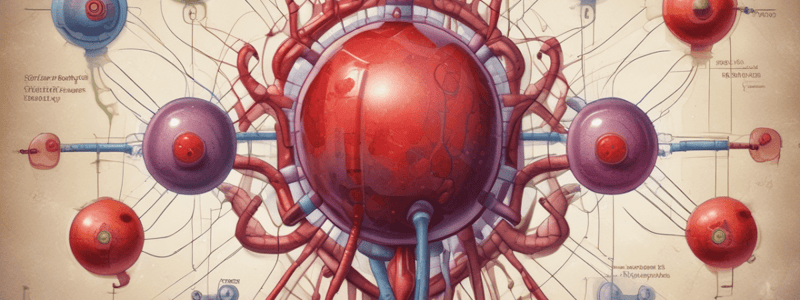Podcast
Questions and Answers
What class of immunoglobulins are cold antibodies usually?
What class of immunoglobulins are cold antibodies usually?
IgM
At what temperature do cold antibodies react optimally?
At what temperature do cold antibodies react optimally?
4°C
What are the most important cold antibodies in terms of blood transfusion?
What are the most important cold antibodies in terms of blood transfusion?
anti-A and anti-B
What other blood group systems, besides ABO, can have cold antibodies?
What other blood group systems, besides ABO, can have cold antibodies?
Why are they called cold antibodies despite reacting at 37°C?
Why are they called cold antibodies despite reacting at 37°C?
Which class of immunoglobulins is capable of transplacental passage from mother to fetus?
Which class of immunoglobulins is capable of transplacental passage from mother to fetus?
What is the most important immune antibody in terms of its potential to cause hemolytic disease of the newborn?
What is the most important immune antibody in terms of its potential to cause hemolytic disease of the newborn?
Why is transplacental passage of IgG antibodies significant?
Why is transplacental passage of IgG antibodies significant?
What is the significance of the Rh Ab (anti-D) in pregnancy?
What is the significance of the Rh Ab (anti-D) in pregnancy?
Why is it important to identify and monitor Rh-negative women during pregnancy?
Why is it important to identify and monitor Rh-negative women during pregnancy?
What is the terminal sugar found on the H antigen of the O blood group?
What is the terminal sugar found on the H antigen of the O blood group?
What is the additional sugar found on the A antigen?
What is the additional sugar found on the A antigen?
What is the difference between the B antigen and the H antigen?
What is the difference between the B antigen and the H antigen?
What is the common sugar found on the H antigen of the O blood group?
What is the common sugar found on the H antigen of the O blood group?
How do the A and B antigens differ from the H antigen?
How do the A and B antigens differ from the H antigen?
When both A and B genes are inherited, how do the B enzyme and A enzyme interact with the H substance?
When both A and B genes are inherited, how do the B enzyme and A enzyme interact with the H substance?
What is the name of the enzyme associated with the A gene?
What is the name of the enzyme associated with the A gene?
How do the B enzyme and A enzyme differ in their interaction with the H substance?
How do the B enzyme and A enzyme differ in their interaction with the H substance?
What is the name of the enzyme associated with the B gene?
What is the name of the enzyme associated with the B gene?
What happens when both A and B genes are inherited in terms of enzyme interaction with the H substance?
What happens when both A and B genes are inherited in terms of enzyme interaction with the H substance?
On an AB adult cell, how do the average number of A antigen sites compare to B antigen sites?
On an AB adult cell, how do the average number of A antigen sites compare to B antigen sites?
When do the ABH antigens develop in fetal life?
When do the ABH antigens develop in fetal life?
Do the ABH antigens increase in strength during the gestational period?
Do the ABH antigens increase in strength during the gestational period?
What is a characteristic of the ABH antigens in terms of their development and strength?
What is a characteristic of the ABH antigens in terms of their development and strength?
What can be said about the strength of ABH antigens after they develop in fetal life?
What can be said about the strength of ABH antigens after they develop in fetal life?
Flashcards are hidden until you start studying
Study Notes
Cold Antibodies
- Cold antibodies are usually IgM and react optimally at a cold temperature of 4°C.
- Despite being reactive at 37°C, they are still referred to as cold antibodies.
- The most important cold antibodies are anti-A and anti-B.
Other Blood Group Systems
- Other blood group systems for which antibodies exist include Hh, Ii, Lewis, MN, and P.
Transplacental Passage
- Only IgG antibodies are capable of passing from mother to fetus through the placenta.
Rh Antibody (Anti-D)
- The Rh antibody (anti-D) is the most important immune antibody.
ABO Blood Group Antigens
- The H antigen of the O blood group has a terminal L-fucose (fuc).
- The A antigen has an additional N-acetyl galactosamine (galnac).
- The B antigen has an additional D-galactose (gal).
Enzyme Competition
- When both A and B genes are inherited, the B enzyme (α-3-D-galactosyltransferase) competes more efficiently for the H substance than the A enzyme (α-3-N-acetylgalactosaminyltransferase).
AB Antigen Sites
- On an AB adult cell, the average number of A antigen sites is less than B antigen sites.
Development of ABH Antigens
- ABH antigens develop early in fetal life but do not increase much in strength during the gestational period.
Studying That Suits You
Use AI to generate personalized quizzes and flashcards to suit your learning preferences.

